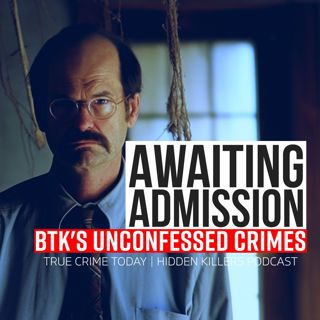
Is BTK Dennis Rader Creating New Sick Fantasies For Himself With Renewed Attention?
Om avsnittet
The BTK (Bind, Torture, Kill) Killer, Dennis Rader, has returned to the spotlight as investigators probe a possible link between him and the disappearance of Cynthia Kinney in 1976. The connection was instigated after it was discovered that Rader mentioned the phrase "bad laundry day" in his writings, intriguingly similar to the circumstances surrounding Kinney's disappearance from her parents' laundromat. Osage County Sheriff Eddie Virden has been vocal about this development and the ongoing investigation into five cold cases, as revealed by Carrie Rosson, daughter of one of the victims. In the latest episode of the podcast "Hidden Killers," Tony Brueski discusses this chilling development with retired FBI Special Agent, Robin Dreeke. "How deep do we go here? How deep do you think we're going to go here as this horrible movie now gets its third installment. If nothing else, we'll, some of these families might finally find some rest of understanding what happened. And so that, I think, is potentially helpful," Brueski says, contemplating the magnitude of the situation. Dreeke then delves into the psychology of serial killers, explaining the conflicting desires of grandiosity and power and control. Many serial killers, like the BTK, seek attention and acknowledgment for their heinous acts while simultaneously wanting to withhold information to maintain a sense of power and superiority. This delicate balance often leads to partial confessions, where killers admit to some murders while keeping others secret. "And so it's balancing, you know, giving as much as you need to. To have the feeling of grandiosity and greatest in the world at their horrendous acts. At the same time holding some back because it makes me feel even better and more empowered that I got away with this and they never even knew about this," Dreeke explains. Rader, who has been vocal about certain cases since the emergence of the Kohberger case, has not yet confessed to the additional murders, despite a deal on the table that offers immunity in exchange for a confession. Brueski speculates that Rader, now 78, might be seeking a final moment of fame before his death. Dreeke agrees with this assessment, adding that people had stopped listening to Rader until the emergence of another serial killer with similar modus operandi brought him back into the public eye. In a shocking revelation, Sheriff Eddie Den, who spoke to Rader in his cell several times over the summer, shared that Rader voluntarily described a fantasy involving a girl in a laundromat, eerily similar to the Kinney case. This spontaneous admission, even before being informed of the case under investigation, raised questions about Rader's intentions. Dreeke theorizes that by reliving the fantasy with law enforcement, Rader is creating a new fantasy for himself, exercising control and power over them by captivating them with his story. The discussion highlights the complexities involved in dealing with serial killers and the delicate balance between their desires for grandiosity and power and control. As the investigation into the cold cases continues, it remains to be seen whether Rader will finally confess to the additional murders or continue to play mind games with law enforcement. Ultimately, the hope is that the families of the victims can finally find some semblance of peace and understanding. Want to listen to ALL of our podcasts AD-FREE? Subscribe through APPLE PODCASTS, and try it for three days free: https://tinyurl.com/ycw626tj Follow Our Other Cases: https://www.truecrimetodaypod.com The latest on Catching the Long Island Serial Killer, Awaiting Admission: BTK’s Unconfessed Crimes, Chad & Lori Daybell, The Murder of Ana Walshe, Alex Murdaugh, Bryan Kohberger, Lucy Letby, Kouri Richins, Justice for Harmony Montgomery, The Murder of Stephen Smith, The Murder of Madeline Kingsbury, and much more! Listen a